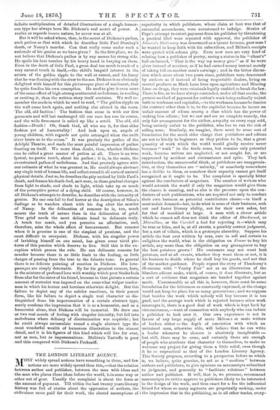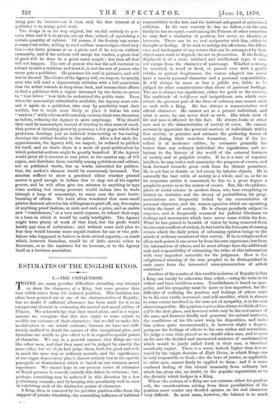THE LONDON LITERARY AGENCY.
ltirOST widely spread notions have something in them, and few A!1 notions are mere widely spread than this,—that the relation 'between author and publisher, between the man with ideas and "the man who places those ideas before the world, is in some way or -other out of gear. Usually the complaint is about the form or "the amount of payment. Till within the last twenty years literary 'history was full of stories about the oppression of authors, the I:ridiculous sums ,paid for their work, the absurd assumptions of
superiority in which publishers, whose claim at beat was that of successful accoucheurs, were accustomed to indulge. Stories of Pope's attempt to extort payment from his publisher by threatening a poetical libel were repeated with approval, the publisher of Johnson's Dictionary was denounced as a tyrant because, poor man! he wanted to keep faith with his subscribers, and Milton's receipts were quoted with solemn pity. Even now men are very fond of relating how a publisher of poetry, seeing a statue in his "client's" hall exclaimed, "That is the way my money goes !" as if he were giver instead of receiver, as if he had earned money instead merely of taking toll on another man's earnings ; and in the bitter discus- sion which arose about two years since, publishers were denounced by authors as if instead of being respectable dealers, living on mental products as Mark Lane lives upon agriculture and Mincing Lane on drugs, they were criminals legally enabled to break the law. There is fire, as we have always contended, under all that smoke, the present method of payment for author's work being radically unjust both to workman and eapitalist,—to the workman becausehe fancies the contract other than it is, to the capitalist because he incurs an unfair amount of odium among a class which has the power of making him odious ; but we saw and see no complete remedy, the only fair arrangement for the author, a royalty on every copy sold, being entirely unfair to the publisher, who has to run the risk of selling none. Similarly, we imagine, there must be some sort of foundation for the much older charge that publishers and editors are not so kindly to beginners as they profess to be, that a great quantity of work which the world would gladly receive never becomes " work" in the trade sense, but remains only potential wotk, because writers are neglected, or not sought for, or are suppressed by accident and circumstance and spite. They lack introduction, the unsuccessful think, or publishers are unapprecia- tive, or they themselves are "unlucky," or somebody somewhere has a dislike to them, or somehow their capacity cannot get itself recognized as it ought to be. The complaint is specially bitter against the conductors of magazines. The number of writers who would astonish the world if only the magazines would give them the chance is amazing, and so also is the pressure upon the con- ductors of such publications, who are required not only to conduct their own business as potential contributors choose—in itself a most unfair demand—but, to do what is none of their business, seek out and foster literary ability, not for their owit sakes, but for that of mankind at large. A man with a clever article which he cannot sell does not think the editor of Blackwood, or Macmillan, or the Cornhill a fool for rejecting it—which may be true or false, and is, at all events, a possibly correct judgment, but a sort of villain, which is a grotesque absurdity. Suppose his article the best ever written by man, sure to sell and certain to enlighten the world, what is the obligation on Fraser to buy his article, any more than the obligation on any greengrocer to buy the best potatoes grown ? His customers may not want best potatoes, and at all events, whether they want them or not, it is his business to decide where he shall buy his goods, and not that of the market-gardener. People repeat the story of Thackeray's ill-success with "Vanity Fair" not as an illustration of the blunders editors make, which, of course, it does illustrate, but as a sort of evidence that magazines are banded together against merit. Unreasonable as all this is, however, there must be some foundation for the bitterness so constantly expressed, or the charge would not keep its place for so many generations ; and we suppose that besides the work which nobody will buy because it is too good, and the average work which is rejected because other work intercepts it, there is a good deal of work which is kept back by circumstances,—want of connection with anybody who can induce a publisher to look over it. Our own experience is not in favour of any large supply of mute Milton s or mute writers of leaders either — the depth of conviction with which an untrained man, otherwise able, will believe that he can write a leader whenever he chooses is absolutely inexplicable — but still, there may be some, and certainly there are enough of people who attribute that character to themselves, to make us welcome any project for giving them a little relief, even though it be as unpractical as that of the London Literary Agency. This Society proposes, according to a prospectus before us which is, we believe, quite genuine, to act as a " medium " between authors and publishers, to give opinions on manuscripts submitted to judgment, and generally to "facilitate relations" between author and publisher. It will, that is, we presume, recommend manuscripts its critics approve to publishers likely to be interested in the design of the work, and thus enact for a fee the influential friend for whom so many aspirants are perpetually seeking, under the impression that in the publishing, as in all other trades, every-
thing goes by interest—as it does, only the first interest of a publisher is to accept good work.
The design is in its way original, but we fail entirely to per- ceive what end it is to attain, except that, indeed, of squelching a certain quantity of rubbish. Of course, if the Society can secure a competent critic, willing to read endless manuscripts—God help him !—for three guineas or so a piece, and if he rejects rubbish summarily, and if the authors will accept his verdict, a great deal of good will be done to a great many people ; but then all that will not happen. The sort of person who has the self-restraint to submit to such a criticism and trust it, is not the sort of person who never gets a publisher. He possesses his soul in patience, and will win in the end. The clients of the Agency will, we suspect, be usually men who will read a depreciatory criticism with a full conviction that the writer intends to keep them back, and resume their efforts to find a publisher with a vigour increased by the desire to prove to "that fellow" how little he understood the public taste. Even when the manuscript submitted is available, the Agency must sub- mit it again to a publisher, who may by possibility trust their verdict, but is much more likely to place it before his own "readers ;" while editors will certainly exercise their own discretion as before, reducing the Agency to mere surplusage. Why should they read its manuscripts, instead of trusting to that sense of smell, that power of detecting power by perusing a few pages which their profession develops, just as habitual wine-tasting or tea-tasting develops the critical faculty in the palate. After a few such dis- appointments, the Agency will, we suspect, be reduced to publish for itself, and no doubt there is a mode of quasi-publication by which potential authors might be greatly benefited. If the Agency would print all it receives at cost price, to the number say, of 100 copies, and distribute them carefully among publishers and editors, not as published works, but as works submitted for publica- tion, the author's chances would be enormously increased. Ten minutes suffices to show a practised editor whether printed matter is good enough to induce him to step out of his regular groove, and he will often give ten minutes to anything in type when nothing but strong pressure would induce him to wade through a heap of manuscript, to many men the most heart- breaking of efforts. We have often wondered that some small printer does not advertise his willingness to print off, say, five copies of anything proof fashion, at such and such a price, and so enable new "contributors," at a very small expense, to submit their copy in a form in which it would be easily intelligible. The Agency might have plenty of work of that kind, but the profit would hardly pay men of cultivation ; and without some such plan we fear they would become mere unpaid readers for one or two pub- lishers who happened to believe in their critical capacity,—a result which, however blameless, would be of little service either to literature, or to the aspirants for its honours, or to the Agency itself as a business association.































 Previous page
Previous page